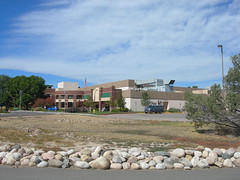
The left wing of the Colorado State Vet Teaching Hospital holds a service that caters to animals’ counterparts, pet owners.
Unknown to many students on campus, the Argus Institute handles the human side of animal well-being.
“We have our clinic programs, which provides emotional support to clients who are dealing with difficult situations (that involves their pets),” said Gail Bishop, clinic coordinator and counselor at the Argus Institute.
“(Argus) is part of the health care team. You have a resident, you’ll have a doctor or veterinary medicine, you’ll have a student, sometimes a nurse, and then a lot of times they ask an Argus counselor to be involved,” Bishop said. “The team now is the health care team for the family; most of them focuses on the patient, which is the dog, cat, lizard, horse, llama or monkey. And then we focus on the client, the human part of that equation.”
From talking to owners about the decision of euthanizing a beloved animal, to supporting children through their pet’s surgery, the Argus staff in the vet hospital “work much like social workers in a human hospital,” Bishop said. This also involves other emotionally charged topics like dealing with end of life issues and surgery liaisons, which help a family understand what is happening while their pet goes under the knife.
“It’s fun, dynamic, serious,” Bishop said about many of the cases she receives working for Argus. “It’s very sacred work.”
The institute usually handles five to six cases a day that can last a half-hour to six hours at a time.
Dr. Steve Withrow created the Argus Institute in 1984 after realizing his oncology team was not able to care for their clients emotional needs, according to a newsletter from the Argus Institute. Withrow contacted the Department of Human Development and Family Studies to ask for help. Laurel Langoni and Carolyn Butler, co-founders of the institute, answered his call.
A client of the hospital for many years, Virginia Vaughan has recently discovered the services and benefits that Argus has offered since it began over 25 years ago.
“I’ve known about Argus but wasn’t aware of the full extent of their services until January,” Vaughn said.
Vaughn lost one of her dogs, Buster, in February, and Argus was holding her hand through it all.
“It’s an amazing addition to the vet teaching hospital,” Vaughn said. “It would be terrible if it didn’t exist.” Both of Vaughn’s dogs have had many health problems; Argus has accompanied her to appointments and regularly checked on her and her pets. The “huge and wonderful support” Argus gave her has helped Vaughn through difficult times.
As part of the Vet Teaching Hospital, Argus stands behind strong teaching values in addition to helping clients like Vaughn.
“We teach in all four years of their school,” Bishop said. “The premier course is in their junior year.” Students in both junior and senior year learn in communication labs in which they simulate scenarios similar to those they would see in the hospital with paid actors and actresses.
“Argus is involved in oncology rounds on Fridays so we tag on to their medical rounds and we do 30 minutes of communication rounds,” Bishop said. They make sure to talk with the doctors about how their week went. “It’s kind of like debriefing cases but it’s not about the medicine, it’s about the communication.”
Content Producer Corinne Winthrop can be reached at news@collegian.com.





